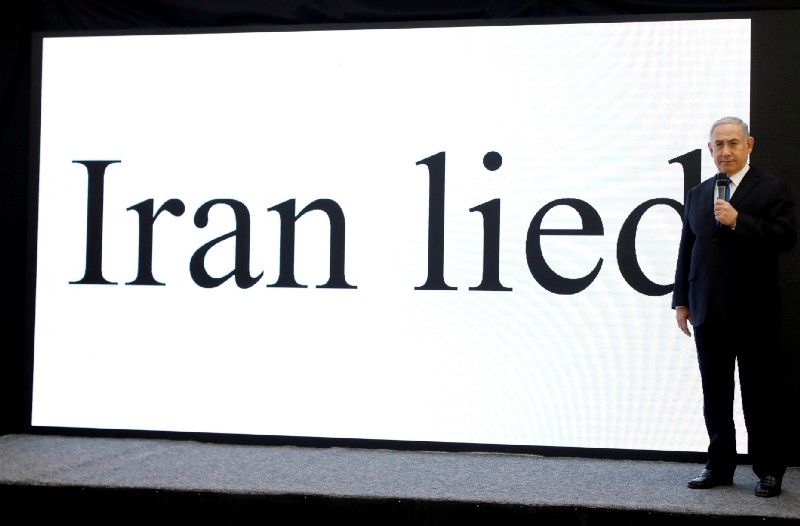May 01, 2018
There’s your inside voice. There’s your OUTSIDE VOICE. AND THEN THERE’S BIBI NETANYAHU’S 2,000 POINT PRESENTATION FONT VOICE which he used Monday to accuse Iran of lying about its efforts to build nuclear weapons.
In a bizarrely theatrical performance, the Israeli prime minister unveiled 55,000 pages of Iranian documents that meticulously document the Islamic Republic’s nuclear program. Proof, he said, that Tehran had been deceiving the world about the intentions of its nuclear program as it negotiated the Iran nuclear deal back in 2015. All the more reason, he said, for the US to leave the deal.
But, as many knowledgeable observers quickly pointed out, the document cache — stolen from a Tehran warehouse by Mossad agents in the dead of night — doesn’t show that Tehran has violated the deal since it went into effect in 2016.
So who exactly was Bibi’s audience? Iran, for one thing. Swiping 55,000 pages of documents from right under the Mullahs’ noses is a deliciously humiliating taunt of its own. Bibi’s other main target is Donald Trump, who must decide by 12 May whether to pull the US out of the Iran deal, which Netanyahu always vehemently opposed.
But it hardly seems likely that the Donald needs a nudge from Bibi. The US president has made no secret of his disdain for the accord — chiefly because its main provisions expire over time and because it doesn’t rein in Tehran’s regional ambitions. Trump appeared unmoved by French President Emmanuel Macron’s efforts last week to find a compromise that would keep the US in the deal. And his top advisers — National Security Adviser John Bolton and Secretary of State Mike Pompeo — both want to scrap the deal too.
Two-thousand points for Bibi’s effort here, but he may be pushing on an open door.
More For You
- YouTube
At the 2026 World Economic Forum in Davos, GZERO’s Tony Maciulis spoke with Ariel Ekblaw, Founder of the Aurelia Institute, about how scaling up infrastructure in space could unlock transformative breakthroughs on Earth.
Most Popular
Haitian soldiers keep a watch outside the venue where businessman Laurent Saint-Cyr is set to be designated as president of Haiti's Transitional Presidential Council (CPT), in Port-au-Prince, Haiti, August 7, 2025.
REUTERS/Fildor Pq Egeder/File Photo
On Friday, US officials warned the transitional council in charge of Haiti not to remove interim Prime Minister Alix Didier Fils-Aimé, ahead of a deadline for the council to step down on Feb. 7.
Moldovan President Maia Sandu speaks during a Council of Europe diplomatic conference to launch the International Claims Commission for Ukraine, aimed at handling compensation claims related to Russia's war in Ukraine, in The Hague, Netherlands, December 16, 2025.
REUTERS/Piroschka van de Wouw
The president of the tiny eastern European country has suggested possibly merging with a neighbor.
Hard numbers: US pitches “New Gaza,” Japan paves way for snap elections, “Sinners” smashes records, & More
Jan 23, 2026
Middle East negotiator and son-in-law of President Trump, Jared Kushner talks with Israeli diplomats following a joint press conference in the State Dining Room of the White House in Washington, DC, USA, 29 September 2025.
$25 billion: The minimum amount of investment required to fulfil Jared Kushner’s ambitious property plan for Gaza.
© 2025 GZERO Media. All Rights Reserved | A Eurasia Group media company.
